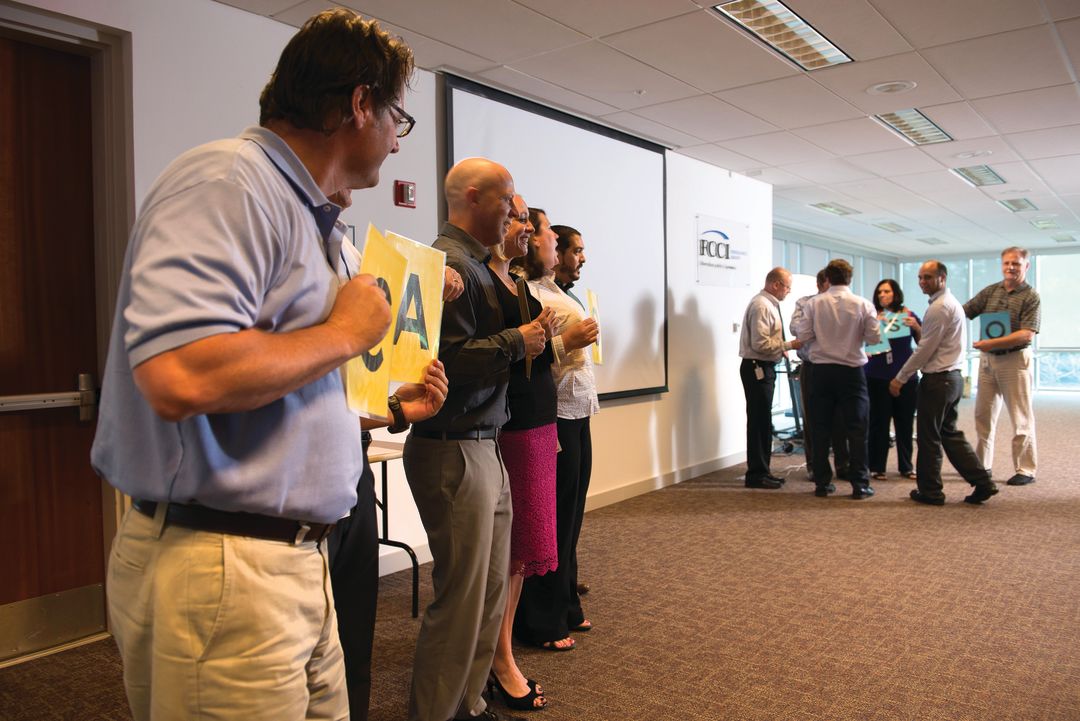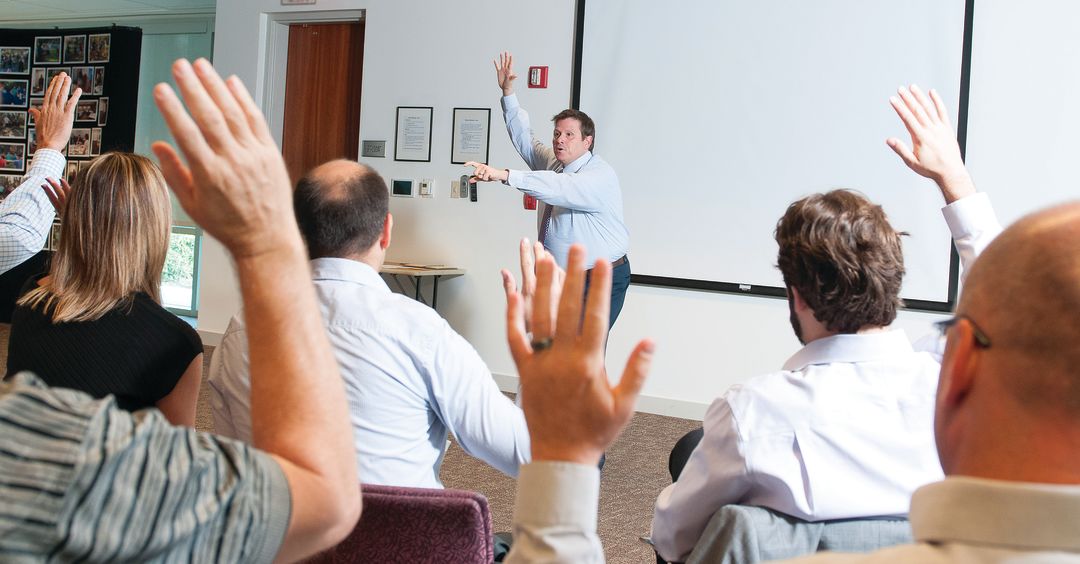A Sports-Inspired Company Turns Execs into Business Champions
In 1997, after winning his second Australian Open and fourth Wimbledon title, tennis wunderkind Pete Sampras needed help. He had the serve and volley down, but not the game off court, where the shy pro struggled with reporters’ questions.
Enter actor Steve Shenbaum. Turns out 1997 was a big year for him, too—and not just because of his role as Ted on the TV series Sabrina, The Teenage Witch. An actress friend, a fellow Northwestern University alum, introduced him to Sampras, and Shenbaum shared a few pointers. Make eye contact. Open your body language. Talk about what you know best: yourself and your sport. Feel free to laugh.
Game on Nation was born.
Shenbaum kept acting (American Pie 2, Will & Grace, scads of commercials), but his consulting work was earning bigger raves. Many noticed Sampras’ new ease with the press and public. In 2003, it was all hankies on deck as Sampras announced his retirement from tennis, his young son in his arms.
“He had the confidence to deliver that speech without a script,” recalls Shenbaum. “For Pete to be on center court not in his tennis outfit but in his coat and tie, speaking from the heart, was a championship in and of itself.”
That got Shenbaum and Sampras’ representatives at IMG Academy thinking: Maybe other athletes could benefit from performance training. So, in 2003, Shenbaum moved to Bradenton to partner with IMG Academy.
Growing in a growing field
Although Shenbaum helped a few top draft picks step up to the mic—Sports Illustrated dubbed him “the man who will save us from the boring athlete interview”—he had a wider ambition: to effect change within organizations, not just individuals. Game on Nation’s ambitious goal became: “improve the world through authentic and purposeful engagement.”
The firm focuses on communication, leadership, resiliency and team-building training. It delivers customized programs to three groups: professional and top collegiate athletes and their organizations; companies and nonprofits; and the military. Its clients range from NASCAR to the NBA Rookie Transition Program, the University of Mississippi to Amherst College, TD Bank to Under Armour, the USO to the U.S. Marines.
Leadership training is a growing global business, with revenues of about $170 billion per year in the United States alone, by some estimates. According to the Association for Talent Development, U.S. companies in 2015 spent an average of more than $1,200 per employee on learning experiences. Game on is on track to gross around $1.3 million this year from live presentations, online resources and consulting services.
The company’s staff has grown to four principals and eight “communication consultants,” mostly actors, comedians and athletes in various locations who expand the firm’s geographic reach. Shenbaum is the boss and visionary. Hired as an intern in 2004, exuberant Bradenton native Blair Bloomston (“no caffeine—or else I’m too much”) has risen to vice president as a master of “gamification” and the lead on sales. In 2009 improv actor and marketer Chris Friday joined the team as a curriculum developer and logistical point man.
In 2012, the company separated from IMG, relocating to a bungalow along Manatee Avenue. Three years later, the firm hired AJ Lee, a former Division 1 gymnast, as director of marketing. But everyone in the quartet has a hand in everything.
In a field with plenty of competition, game on Nation says its training techniques set it apart. Sessions touch on such evergreen themes as “valuing each other’s differences,” “seeing change as opportunity,” or “staying positive under pressure.” But game on avoids dream catchers and energy waves, trust falls and ropes course. Instead, the firm draws on its bank of more than 70 games, each no more than 15 minutes, each with a pithy “tie-back” message. To qualify, each activity must incorporate mystery, incentive, laughter and empowerment—MILE, in game on-speak.
“We want our audience to take part in an experience that lets authentic conversation and truth come to the surface,” says Shenbaum.
CEO buy-in
Forbes reports that leadership training often fails because of a mistaken emphasis on rote processes and canned techniques. Other critics point out the difficulty of assessing staff development programs. They can be useless if office culture undercuts the messages. When a company, team or military organization approaches game on, Shenbaum asks to start at the top. If the executives or owners or commanders agree to play, “There’s much more potential for impact,” he says.
Shenbaum promises clients increased loyalty, productivity and a sense of workforce well-being. Sarasota-based FCCI Insurance Group, with 816 workers and $2.2 billion in assets, taps game on for a variety of staff development programs. Kristi Hoskinson, FCCI’s manager of personal and professional development, says the programs get high rankings in post-workshop surveys: “Comments tell us that it’s resonating. Teammates say they’re emboldened and empowered to act out what they learn.”
She adds, “Every game is strategic, tailored to the outcome we want to achieve. I know of no other firm that does communication and leadership development with such an emphasis on care, compassion and leading with integrity.”

A morning of ‘purposeful fun’
FCCI targets emerging leaders at the company and puts them through eight monthly sessions that focus on developing communication skills and building strong teams and relationships. Last May, for the third year in a row, FCCI brought in game on to “tie the bow” on the training. Twenty of FCCI Insurance Group’s mid-level professionals gathered at the Sarasota home office for this finale. There is no lectern, no PowerPoint, no mention of previous lessons on topics like “conflict management” and “coaching for peak performance.” Just Friday, Bloomston, and Lee from game on Nation, ready to play.
The theme of the day: “Celebrate It.”
“Jack, is it?” asks Friday, as he points to senior claims adjuster Jack Sowers. “Let’s celebrate Jack.”
Amid vigorous applause, blushing Sowers steps to the front of the semicircle. Friday sets out rules for the game “One Two Three.” He and Jack stand face-to-face, look each other in the eyes, and alternately count to three. Then they substitute a clap for 1, then a snap for 2, then a stomp for 3. Soon the whole room pairs up, counting, clapping, snapping, stomping—making mistakes and laughing. Partners are in this together.
“I never said you have to go fast,” says Friday. “But how often do we put deadlines on ourselves, even when we don’t have to?”
He acts out how coworkers avoid eye contact when passing in the hall, how he himself tunes out his wife while tapping on his cell phone. “So the tie-back for this game is, ‘Don’t bounce, don’t stare, connect’,” he says. “Connection is key.”
The challenge of this kind of interactive training lies in making “eureka” moments last.
“If you’ve really connected, then people will remember how that felt, and the information becomes ‘sticky,’” says Bloomston.

Image: Barbara Banks
Lessons leavened by laughter
“This isn’t about playing around,” says Shenbaum. Just as an ill-structured fitness exercise can pull muscles or strain tendons, a training game with a sexually inappropriate joke or unacknowledged racial slight can do more harm than good. “We have to deliver interactivity in a way that honors participants,” he says. The background tie-back for every MILE game is, laugh with, not at.
In “Last Letter First Letter,” Bloomston and Julie Smith, a senior marketing underwriter at FCCI, pretend they are chatty dishwashers —a little improv complicated by an extra rule: Each woman has to begin her sentence with the last letter of the last word her partner speaks. When the chuckles die down, trainer Friday invites the rest of the group to pair up and try it. In the debriefing, he reveals the tie-back: Let them finish. In other words, listen before formulating a response.
One of FCCI’s emerging leaders quips, “Made me think before I speak, which I never do.”
Shenbaum might call that truth coming to the surface.
To settle the room before a break, Bloomston introduces “Coins.” It’s not a game as much as a rumination and guided meditation about work-life balance. Coins are the things we love outside of the job—the jingle in our pocket, the instant dopamine hit, the connection back to our values. Bloomston’s are her kids, Taco Tuesday, and New York City.
“Who loves steak? Who can cook it? Who loves sushi? Who hates it?” Bloomston asks.
Fingering our coins, she explains, can soften a game face or turn a rant to a rave. Leaders, for example, might do well to ask their team not “How was your day?” but “What was the best part of your day?”
The next 20 years
For now, game on stages about 300 events a year. Twenty percent of them are local, ranging in length from 90 minutes to three days. It’s a point of pride for the company that bookings have multiplied without any advertising, not even on Facebook.
Shenbaum, who has a wife and two daughters, ages 3 and 5, says he works hard but doesn’t believe in “rise and grind.” He’s not pushing for a major expansion. He enjoys the flexibility of running the show, unbeholden to investors or a board of directors. Game on is venturing into creating web resources, though, to supplement the high-touch sessions.
In the early days of game on, Shenbaum received a letter from Sampras that said, “I wish this kind of program was offered when I was younger.” That’s a reminder for Shenbaum on the importance of sharing his company’s insights with organizations as early as possible in their development— “before it’s too late” for change, he says.